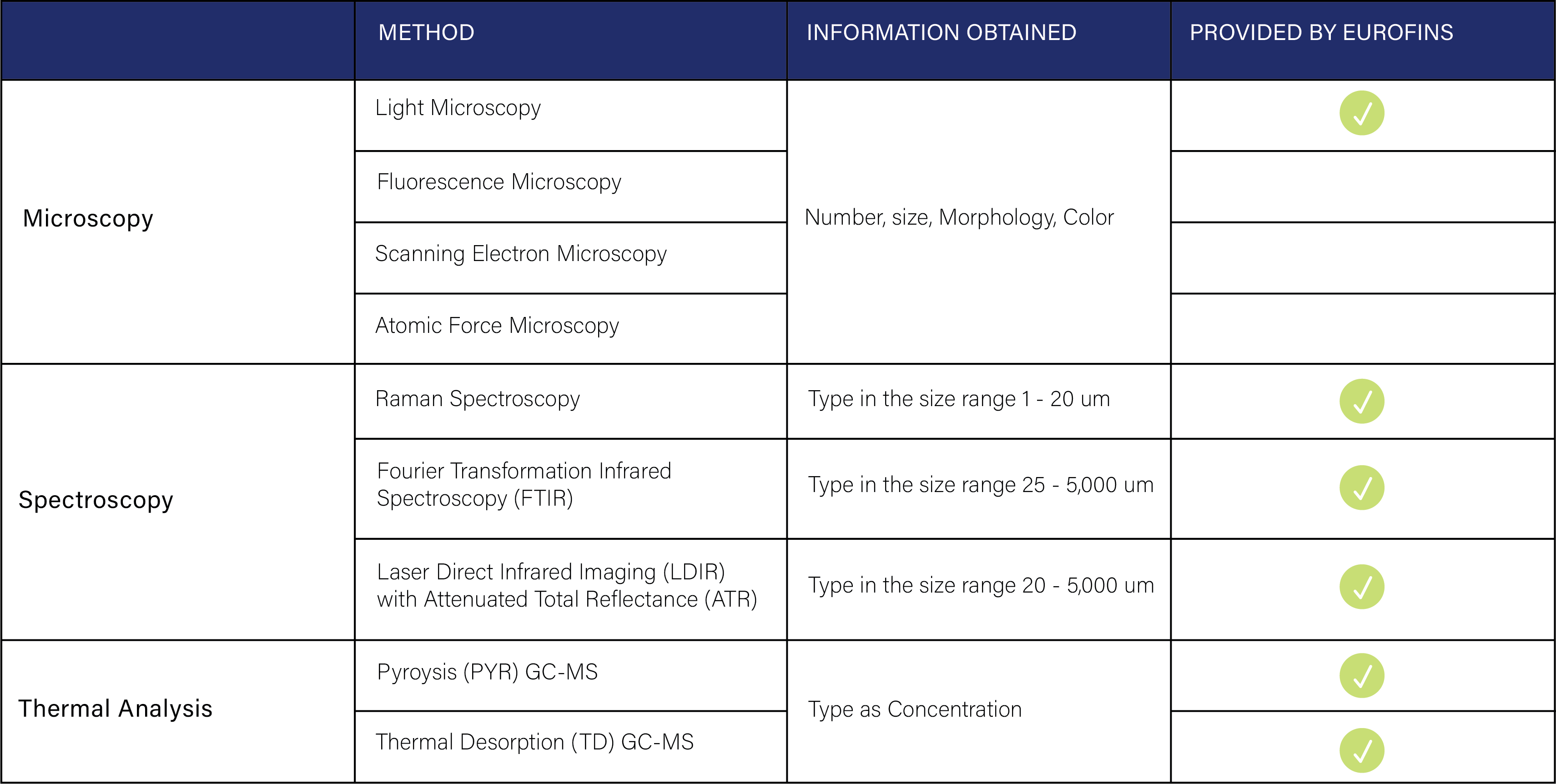Microplastics Testing


Eurofins is committing to staying at the forefront of the development of new methods in order to assist our customers with monitoring all “compounds” of concern, including microplastics, for the benefit of our societies.
Microplastics (plastic particles <5 mm) do not biodegrade in the environment and are an emerging topic of concern. Eurofins has laboratories across the globe that test for microplastics to assist you in getting the data you need to make the correct decisions related to these potentially harmful contaminants.
Microplastic is still a new field of study, with several different measurement methods and techniques currently being developed. These methods have different strengths and weaknesses. To determine the best method for your needs, please contact one of our laboratories and together, we will find the best solution from our wide range of services.
What are microplastics and why should you care?
Plastics have become an integral part of our daily lives, used in many products for their incredible versatility. In 2017 humans have produced over 9.2 billion tons of plastic since 1950, and this number continues to rise rapidly.
However, management of plastic waste has fallen behind, leading to significant accumulation in the environment. Due to its remarkable durability, plastic gradually breaks down into smaller particles called microplastics through weathering and disintegration, which can ultimately end up in our oceans and streams.
Primary microplastics can also be intentionally added to a range of products, from fertilisers, cosmetics, and common household products to industrial strength detergents, cleaning products, paints, plant protection products, and products used by the oil and gas industry. Microplastics are also known to be released from the beads used in artificial turf fields. The European Chemicals Agency (ECHA) states that the European Union/European Economic Area alone uses 145,000 tons of intentionally added microplastic are used per year (ECHA, 2021). In September 2023, the European Commission adopted measures that restrict microplastics that are intentionally added to products under the EU Registration, Evaluation, Authorisation and Restriction of Chemicals (REACH) legislation. The new rules will prevent the release of about half a million tons of microplastics over 20 years to the environment.
Microplastics have been found both in marine and freshwater as well as in the terrestrial ecosystem. Unfortunately, once microplastics enter the environment, they accumulate in animals, ultimately finding their way back to humans through food and drinking water.
The effects of microplastics are still being researched, but it is known that they negatively impact our ecosystem, water quality and even human health, not only because of their physical properties, but through related chemical and biological risks, such as accumulation of toxic chemicals and the transport of pathogens.
Who We Support
- Water boards
- Councils
- Environmental consultancies
- Government programmes
- Academic sector
- Industry & plastic recycling
- Agriculture
- NGOs
- Anyone who is interested!
Matrices We Can Test
- Environmental samples/monitoring:
- Water monitoring
- Drinking water/bottled water/other drinks
- Surface water
- Wastewater
- Ground water
- Sand & sediment
- Soil, sludge, compost and biodegration residues
- Air monitoring
- Food and beverage
- Fish (e.g. tissue, oil)
- Raw milk
- Product testing
- Cosmetics
- Turf
How we test
Testing for microplastics is a fascinating and complex field and the appropriate method will depend on the purpose of the test and the material (water, sludge, cosmetic products, etc.) you would like to test.
What sample/analytical preparation do we use?
Before the sample is analysed on the instrument, it needs to undergo some form of sample preparation or clean-up. The goal of this preparation is to isolate the microplastic, separate it from any interfering compounds in the sample, and make it compatible with the desired measurement technique. The specific process varies between techniques and sample types.
If you want to know more about sample preparation, please contact one of our laboratories.
What measurement techniques can we offer?
All our state-of-the-art microplastic analysis methods provide qualitative results to identify the different polymer types in the samples. Furthermore, we can quantify the number of microplastics, using spectroscopy (Raman, FTIR and LDIR), and report the total mass of particles, using thermoanalytical methods (TD-GC/MS and Pyrolysis-GC/MS). See below for some of the most common measurement techniques used to test for microplastics:

Contact Us Now!
Eurofins is proud to have multiple laboratories in its network that are ready to help with your microplastic testing projects across the globe. Find the closest location to your project below, and our teams will be happy to assist you.
Eurofins Environment Testing Bergen
Sandviksveien 110
Bergen
NO-5035
Norway
Tel:+47 94 50 42 42
Fax:+47 55 54 92 80
bergen@etn.eurofins.com
Eurofins IPROMA
Av. de Los Pirineos nº 9 - Nave17
28703 - S.S. de los Reyes (MADRID)
Spain
Tel:+34 916 587 440
atencioncliente@iproma.com
Eurofins Analytical Services Hungary Kft.
Anonymus u. 6
Budapest
1045
Hungary
Tel:+3618723600
kornyezet@laboratorium.hu
Eurofins Environment Testing Australia Pty Ltd.
6 Monterey Road
VIC 3175
Dandenong South
Australia
Phone: +61 3 8564 5000
MicroPlasticsAUS@eurofinsanz.com
https://www.eurofins.com.au./environment-testing/speciality-services/microplastics/
Eurofins Environment Testing - Sacramento
880 Riverside Parkway,
West Sacramento, CA 95605
Phone: 916-373-5600
Env.Marketing@ET.EurofinsUS.com
https://www.eurofinsus.com/environment-testing/services/specialty-services/microplastics/
Eurofins Consumer Product Testing Vietnam
1/4 Tan Thoi Nhat 18 Street, Tan Thoi Nhat Ward, District 12
Ho Chi Minh City, Vietnam.
Tel : +84 28 7109 8828
Email: CPTVNcs@cpt.eurofinsasia.com
















































